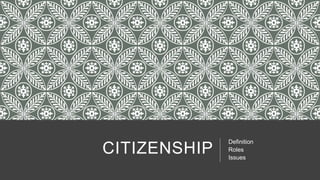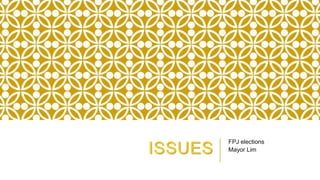This document discusses citizenship in the Philippines, including definitions, rights, roles, and issues. It defines citizenship as a relationship between the individual and state involving reciprocal rights and duties. It outlines the rights of citizens under the Philippine constitution, including natural rights, constitutional rights, and statutory rights. It discusses who qualifies as a Philippine citizen, including those who were citizens at the time the current constitution was adopted and those who become naturalized citizens. It also examines two key issues - whether actor Fernando Poe Jr. qualified as a natural-born citizen in his 2004 presidential run, and the Supreme Court's conclusion that he did based on the citizenship of his grandfather.























